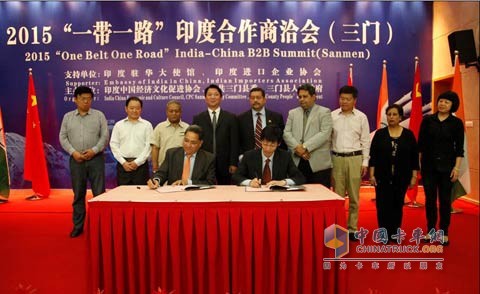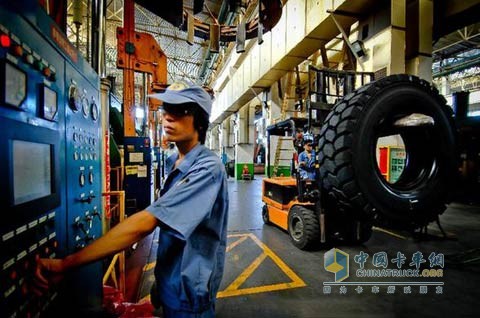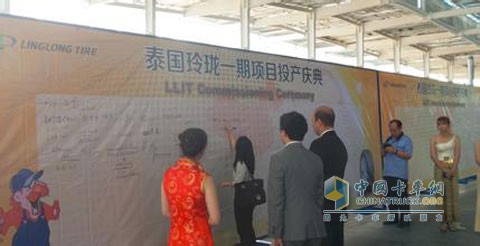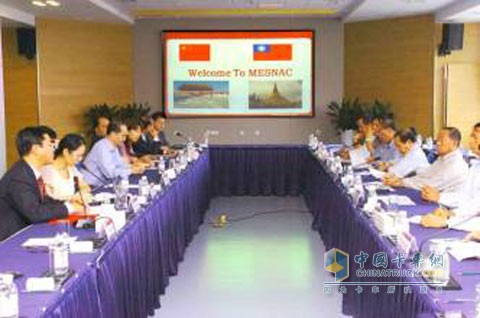The strategy of “going out†has been achieved in 15 years, since it was explicitly put forward during the Third Session of the Ninth National People’s Congress in March 2000. The implementation of the “Belt and Road†national strategy has created new historical opportunities for Chinese enterprises to “go globalâ€. The media learned that domestic rubber tire companies have a strong “going out†will. However, industry insiders also stressed that nowadays companies “go globalâ€, they must change the concept of product output in the past, pursue a higher level of industrial output, achieve win-win cooperation, and allow local companies, people, and the host country to truly benefit from China’s rubber tires. Enterprises become partners they can rely on to establish a brand image in the international market. Corporate passion Some experts believe that the "One Belt and One Road" strategy is the third reform and opening up after the establishment of the Special Economic Zone and China's accession to the WTO, allowing the rubber industry to see an upgraded version of the "Ancient Tea Horse Road," creating a rare opportunity for the development of the Chinese rubber industry. Historical opportunities. "As a big rubber manufacturing country, we must adjust the global trade layout, investment layout and production layout through 'going global'. We can not only export all kinds of rubber products, effectively achieve the outward delivery of production capacity, but also have the ability to provide More equipment and technical support to promote the rapid development of foreign emerging markets.†said Deng Yaxi, president of China Rubber Industry Association. In May of this year, the 2015 “Belt and Road†Indian cooperation meeting was held in Sanmen Station, Zhejiang. During the visit, the Indian delegation visited Yuanchuang Rubber, 3D Rubber and other companies and signed a memorandum of economic and cultural cooperation, indicating that in the future, cooperation in rubber and other fields will be strengthened. Rubber companies are on the move In order to break through the bottleneck of raw materials, China’s earliest “going out†representatives are tire upstream companies such as Guangyu Rubber, Sinochem International, and Hainan Rubber. They set up factories and build rubber plants in the world’s most rubber-rich Southeast Asian countries. A sexual step. “The “going out†strategy has laid a solid foundation for the development of the industry.†Chen Yu, General Manager of Guangsheng Rubber Group, told reporters that as early as 2005, Guangsheng Group had established its first processing plant in Southeast Asia. “Depending on the needs and characteristics of the host country, we have different strategies for 'going out'. For example, Thailand has protective measures for rubber planting. We have established a processing plant in the northeastern region of Thailand to help local farmers get rich; Cambodia has land As for the advantages, we have focused on plantations, and in recent years we have also extended to other economic crops and promoted local economic development,†said Chen Wei. On April 23, with the successful release of the first smoke tablet adhesive, the Guangyu Rubber Taidong Company's smoke tablet adhesive project in Chumphon Province, Thailand, was successfully tested. The picture shows its production workshop. “The next step will firmly grasp the important strategic opportunity of the “Belt and Road†of the country, focus on making overseas resources into three major centers, and realize the listing in Hong Kong.†Chen Wei said that the planning of Guangshen focuses on planting, processing and trade. The Grand Center has established Thailand as an overseas processing center, Cambodia as a planting center, and Singapore as an international marketing center. At the same time, it will integrate high-quality project resources in Southeast Asia, increase the pace of joint-stock reforms, achieve listing in Hong Kong, and accelerate the formation of industrial capital operation advantages. Sinochem International started as a rubber trader and has implemented an upstream extension strategy since 2004. It has become a full-industry chain operator covering the cultivation, processing, and distribution of natural rubber. “The company is engaged in natural rubber planting and processing in 4 countries in Africa, and 2 other countries grow palm trees.†Li Bin, deputy general manager of Sinochem International Natural Rubber Division, said that many rubber tire companies may be transferred out of the “Belt and Road†initiative. In the “going out†road, Sinochem International and Guangwu are relatively early. To avoid detours in their layout and production, they can provide sound advice. It is understood that during the planting phase, Sinochem International and its controlled shareholding enterprises have 280,000 hectares of land in Africa and Southeast Asia, of which 180,000 hectares can be planted. In processing, Sinochem International has 730,000 tons of processing capacity, mainly in China, Southeast Asia and Africa. In 2014, Sinochem International completed the acquisition and delivery of the State Reserve Plastics. The “Going Global†strategy reflects the strategic value of the National Reserve Strategic Materials. In the next step, Sinochem International will solidly promote key strategic projects such as the construction of the Africa Center and seize the opportunity to acquire mature plantations and high-quality processing plants, and steadily increase the scale of rubber cultivation and production and processing capabilities. Rubber machine business introduction technology The “going out†of rubber machinery equipment companies is more to introduce advanced manufacturing technologies, build after-sales service networks and R&D systems, increase the links with tire companies in the local or regional regions, and better provide product support and technical support services for them. Soft Control shares adhere to the "middle and high-end" and "international" development strategy, has established five major marketing service areas in the world, established a global service network; set up three major R & D centers in Europe, North America, and China to build a sound International R & D system. In 2013, the total amount of the “Equipment Sales Contract†signed between the company and Sailing (Vietnam) Co., Ltd. was 261.578 million U.S. dollars and it has now been completed. In December of the same year, it signed a procurement contract with Indian JK Tire Co., Ltd. for an amount of 11348.66 million yuan. Some equipment of this project is still in the process of debugging. On July 26th, Linglong International Tire (Thailand) Co., Ltd. held the 40th Anniversary of the exquisite tire construction and full-line production ceremony of the all-steel project. This is the first truck radial tire produced overseas by the Chinese tire industry. The giant wheel shares that were completed and put into operation in India became the first leg of the trans-border operation of giant wheel stocks. The product positioning is to provide supporting services for India's domestic tire companies and international tire companies in India's production bases and to radiate the entire Southeast Asian market. In 2014, India’s subsidiary accelerated its expansion of production and realized sales revenue of 40,717,700 yuan, a year-on-year increase of 61.7%, accounting for approximately 3.8% of the company’s main revenue for the year. The company will further enhance the international competitiveness of tire molds and rubber machinery products through localized marketing and services. Dalian Rubber & Plastics Co., Ltd. actively promotes technology cooperation with McRolls of Canada and Czech company Buzuluk to achieve complementary advantages among companies. The company plans to seize the favorable opportunity for domestic tire companies to invest overseas to build factories and strive to obtain more orders. Tire enterprises break through barriers In order to break through barriers to overseas trade, in recent years, the racing wheels Jinyu, Linglong Tire, Chinagce Rubber Group, and Sen Unicorn Tire have accelerated the pace of foreign construction and promoted the process of China's tire internationalization strategy. Sai Yuen Jinyu Co., Ltd. began investing in Vietnam in 2011 to set up a Saiwan (Vietnam) Co., Ltd. project with a total investment of US$95 million. At present, semi-steel tires have been put into production profits. Now the company has started the second phase of the project, and the construction scale will increase to an annual output of 7.8 million semi-steel radial tires and 15,000 tons of all-steel engineering tires. The first foreign "turnkey" project of software control - the MEC (Myanmar Economics) tire factory was formally put into operation two years ago, and Myanmar has had its own tire brand since then. Linglong International Tire (Thailand) Co., Ltd. has completed the production of 2 million high-performance semi-steel radial tires in Phase I of the project in February 2014; the second phase of the all-steel radial tire project started construction in June 2014. May 28, 2015 The first tire went off the assembly line. The exquisite company's global strategy is based on Thai factories and eventually reaches three overseas manufacturing bases. On August 4, 2014, Mori Kirin Tire Co., Ltd. and Thailand Taihua Gum Co., Ltd. held a land contract signing ceremony, and Sen Qilin's overseas deployment strategy was officially launched. It is understood that this tire project is located in Lisheng Rubber Industrial Park in Rayong Province, Thailand. It plans to produce 10 million tires a year. “The location of the factory is exactly the view and use of Thailand's rubber resources, trade and location advantages.†Sen Linlin, general manager of Lin Yulong told the media. On June 29th, 2015, Chinace Rubber (Thailand) Co., Ltd. held its opening ceremony in Thailand's Thailand-China Rayong Industrial Park. The plant is the first factory built by the Chinachem Rubber Group in overseas and is currently the largest tire factory in Thailand. It covers a total area of ​​approximately 876 acres. Since the official start of construction on November 7, 2014, the first PCR tires on the May 25th this year, the establishment of a factory miracle. It is understood that at present, the base mainly produces semi-steel radial tires, and by the end of 2015, it will reach a production scale of 5 million pieces/year. Shen Jinrong, chairman of Zhongce Rubber, said that the production base will also invest some of the full steel tire capacity in the future. Carbon black companies eager to try In March of this year, Wanda Group's Shandong Neste Carbon Black participated in the rubber tire exhibition in Indonesia. Chief engineer Chen Xinzhong received information from the exhibition. Indonesia has 5 multinational tire companies and 8 local companies. Annual demand for carbon black At around 500,000 tons, only Cabot's carbon black production companies currently have a gap of about half. Just exporting carbon black to Indonesia requires paying 5% of the import tariff. It is understood that local labor costs are very low and the wages are only RMB 1,600/month. “The overcapacity of domestic carbon blacks, the large volume of export products, and price fights in the international market have caused India to anti-dumping against Chinese carbon blacks. If carbon black companies build factories abroad, such as Indonesia, India and Thailand, they should be a way out.†Chen Xinzhong said. The marketing manager of a well-known steel cord manufacturer in China told the media that the company also intends to follow the pace of tire companies and invest in factories in Thailand. Jiangsu Aoli New Materials Co.,Ltd , https://www.jsaolimaterials.com
2015 "One Belt and One Road" Indian Partner Dealing with Zhejiang Sanmen Station 
Rubber Industry Workshop 
Delicate International Thailand project put into production 
The first foreign "turnkey" project of soft control - the MEC (Myanmar Economic Corporation) tire plant was formally put into operation two years ago